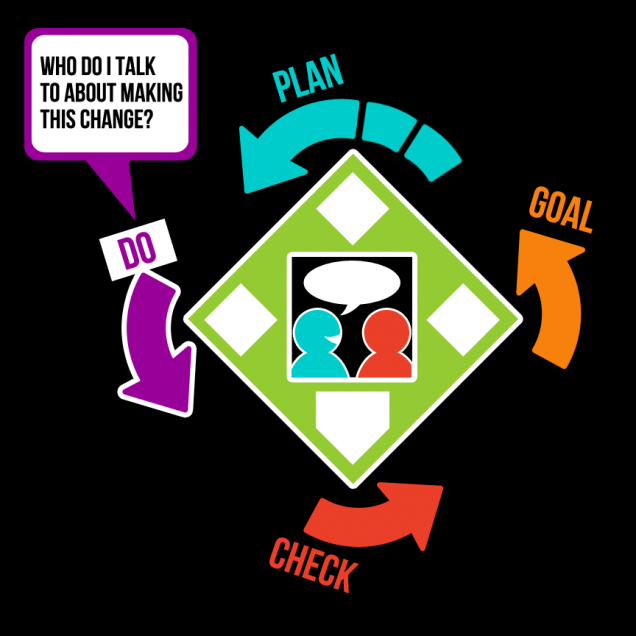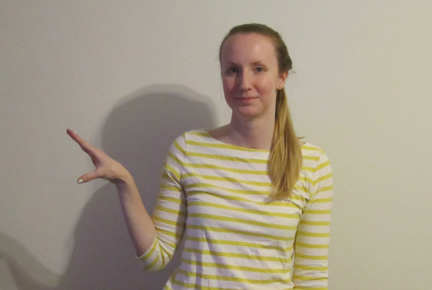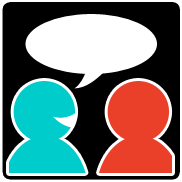Third Base: Do
Contents
- Third Base: Do Introduction
- Why is it important to advocate for myself?
- Disability Rights Laws
- Third Base: Do Game Plan Worksheet
Third Base of the Game Plan is called Third Base: Do. Third Base: Do asks the question, “Who do I talk to about making this change?”
Each base of the Game Plan has a hand motion to help us remember what it means. When we ask “Who do I talk to about making this change?,” we make this motion which represents talking.
Another way to remember that Third Base of the Game Plan is Do, is by remembering the symbol. This symbol for Third Base: Do is two people talking.
Now it is time to ask yourself the question for Third Base: Do, “Who do I talk to about making this change?”
In Project TEAM, you have learned about six strategies you can use to change the environment. But sometimes people can have a hard time even when they try and use a strategy to change the environment. Sometimes, you need to get special permission to use a strategy. For example, you may need to get permission to use the strategy Change the Rules or Use Technology or Things. Sometimes you try to use a strategy and it doesn’t work. For example, maybe you asked someone for help and they didn’t help you. In these examples, you need to advocate for yourself, or speak up about your wants or needs.
There are lots of people in your life who can help you, like your parents, your friends, or a favorite teacher. But when you are advocating for a change in your environment, you need to talk with someone who is in charge, or who has the ability or authority to make the change you are asking. Sometimes, if you are having trouble making the change in your environment, you need to talk to a special person or agency whose job is to help people with disabilities, medical conditions, or in special education change their environment.
Why is it important to advocate for myself?
Have you ever heard of the word “discrimination” before? Discrimination is when people treat other people poorly because they are different.
- Some people think that people with disabilities, medical conditions, and youth in special education are not smart, can’t do things, are unsafe, or can’t be with other teens.
- People who think this way may not let teens with disabilities do the same things as teens without disabilities.
When someone treats you differently because of your disability, medical condition, or because you are in special education, that is discrimination.
Disability Rights Laws
There are laws that protect you against discrimination. These laws can stop people from treating you differently just because you have a disability or because you are in special education. These laws are:
- Individuals with Disabilities Education Act (IDEA)
- American with Disabilities Act (ADA)
- Rehabilitation Act (including section 504)
Because the trainees in Project TEAM are all people with disabilities, medical conditions, or students in special education, these laws can help you meet your goals. Each of these laws will give you the right to ask for changes in your environment. A right is a protection. A right protects us and lets us do something we want to do. Some examples of rights that we have in this country are the right to vote, practice religion, and free speech.
To learn more about the Disability Rights Laws that can help you advocate for change, download the Disability Rights Laws Slideshow.
Please note: the laws in this slideshow may help protect individuals with disabilities and give them a right to ask for a change or to access a specific activity or location. However, the information in this website and slideshow is not meant to substitute for legal advice or to be binding in a court of law. Individuals with more questions about their rights may find support or assistance by contacting:
- Their local center for independent living
- Their regional ADA Technical assistance center
- The state protection and advocacy systems
“Who do I talk to about making this change?”
To reach your goal, you need to talk with someone about the change you need to make in your environment.
Download and print out the Third Base: Do Game Plan Worksheet. We are going to start in the middle of the Game Plan Worksheet at the box that says, “In this situation, are you a…” When you are doing your activity, are you a customer/user, employee, or student?
Different disability rights laws can help us in different ways. It depends on the type of activity you are doing, and if you are a student, an employee, or a customer/user when you are doing the activity. When you are at school, you are a student. When you are going out to a restaurant with your family you are a customer. When you are doing your job, you are an employee. You can be all three types of these people, it depends on the activity you want to do for your goal. Make a choice and check off the box that fits your activity best.
Now you will decide who you can talk to about making a change in your environment. At the top of the page, there is a table. In this table, you can write down the best person to talk to. You can also write down their phone number or email so you can contact them to schedule a meeting if you need to. You may need to use your computer to try and look it up information on the internet about who you can contact.
Now download and print out the Advocating for Change Script. Just like actors in a movie use a script to remember their lines, you can use a script to remember all of the things you want to say to the person who has the authority to help you make a change in your environment. Follow along with the steps of the Advocating for Change Script to fill in what you want to say. When you are finished, you can copy your script to the Third Base: Do page of your Game Plan Worksheet if you want.
Ready to learn more?
Go on to the next part of the Game Plan:



